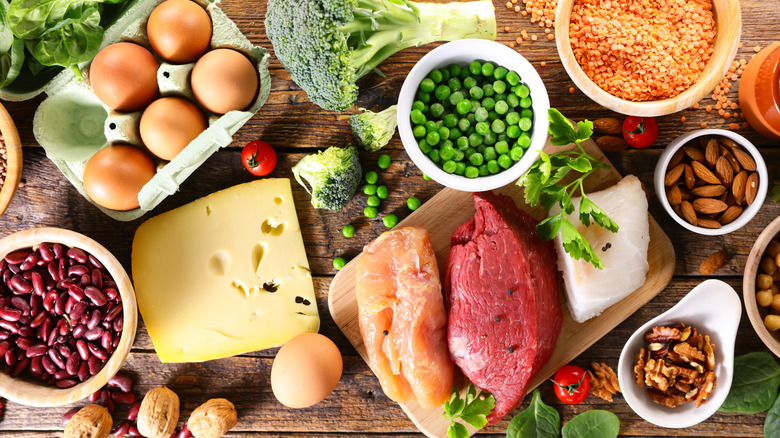How Your Nutritional Needs Change As You Age
As we get older, our nutritional needs change. According to the Office of Disease Prevention and Health Promotion (ODPHP), older adults are more susceptible to diseases and chronic conditions, and one way they can counteract the risks is to eat more nutrient-dense foods. All nutrients are necessary, but some are more important due to the aging process.
One vitamin older adults should be sure they're getting enough of is vitamin D. The sunshine vitamin is important for healthy bones, reduced inflammation, and immune support. Our bodies convert sunlight into vitamin D, but people over the age of 65 produce less of it, per WebMD. Because of this, people up to the age of 70 should get at least 600 IU daily, and those over 70 should aim for 800 IU daily. Sources of vitamin D include salmon, mackerel, swordfish, trout, fortified milk and cereals, eggs, beef liver. You can also supplement your diet with vitamin D.
Calcium is an essential nutrient for older individuals because it helps bones stay strong. In addition, it aids the nerves and muscles, per the National Institutes of Health. Women should aim for 1,200 micrograms per day, and men between the ages of 51 and 70 should get 1,000 micrograms daily. Men over 70 should increase their intake to 1,200 micrograms. Calcium is in many dairy products, but you can also find it in leafy greens, and fortified cereals.
Other vitamins and minerals you need as you age
The body might not absorb nutrients as well as it used to because of digestion issues as we age (via the Mayo Clinic). Vitamin B12 is one vitamin that can be affected by these conditions. The Mayo Clinic reports that vitamin B12 is necessary for nerve function, cell metabolism, and red blood cell formation. The National Institute for Aging (NIA) suggests 2.4 micrograms of vitamin B12 for people over the age of 50. Foods containing vitamin B12 include clams, trout, salmon, yogurt, eggs, and canned tuna fish. You can also add it to your diet through fortified foods like cereal and milk, or with a supplement. (via Harvard Medical School).
Vitamin B6 is another nutrient you may need more of as you age. This vitamin helps the body form red blood cells (via NIA) and it also aids in converting food to energy. The NIA recommends 1.7 micrograms of vitamin B6 for men and 1.5 micrograms for women daily. Sources of this nutrient include dark, leafy greens, fish, fortified cereals, papaya, cantaloupe, and chickpeas (via LiveScience).
The importance of protein
Since muscle mass decreases with age, it is important to consume enough protein. Paul F. Jacques, director of Tufts' HNRCA Nutritional Epidemiology Program, says that about one-third of older adults over 50 years of age don't get the protein they need (via Tufts University). Furthermore, about 10% of women in this age group fail to meet the lower end of the recommended daily allowance (RDA) for the nutrient. Currently, the RDA for protein is 46 grams for women and 56 grams for men, on average. However, some experts think this number should be adjusted for older people. Instead of aiming for a general number, they recommend working toward getting 0.45 grams to 0.68 grams per pound of body weight, per Tufts University.
In addition to that, protein servings should be spread throughout the day. Jacques suggests consuming 25 to 30 grams of protein at breakfast, lunch, and dinner. Another way to help distribute protein would be eating protein-rich snacks, like nuts, string cheese, or yogurt, per Tufts University.


